 W
WCường Để was an early 20th-century Vietnamese revolutionary who, along with Phan Bội Châu, unsuccessfully tried to liberate Vietnam from French colonial occupation.
 W
WEmperor Duy Tân, born Nguyễn Phúc Vĩnh San, was an emperor of the Nguyễn Dynasty who reigned for 9 years between 1907 and 1916.
 W
WVõ Nguyên Giáp was an army general in the Vietnam People's Army and a politician. Võ Nguyên Giáp has been called one of the greatest military strategists of the 20th century. He first rose to prominence during World War II, where he served as the military leader of the Viet Minh resistance against the Japanese occupation of Vietnam and also as Defence Minister & Deputy Prime Minister for nearly 44 years. Giáp was a crucial military commander in two wars: the First Indochina War of 1946–1954, and the Vietnam War of 1955–1975, participating in several historically significant battles: Cao Bằng in 1950, Hòa Bình in 1951–1952, Điện Biên Phủ in 1954, the Tết Offensive in 1968, the Easter Offensive in 1972, and the final Ho Chi Minh Campaign of 1975.
 W
WEmperor Hàm Nghi, personal name Nguyễn Phúc Ưng Lịch, also Nguyễn Phúc Minh, was the eighth Emperor of the Vietnamese Nguyễn Dynasty. He reigned for only one year (1884–85).
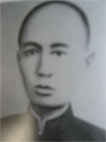 W
WNguyễn Thượng Hiền was a Vietnamese scholar-gentry anti-colonial revolutionary activist who advocated independence from French colonial rule. He was a contemporary of Phan Bội Châu and Phan Châu Trinh and was regarded as the most prominent northerner of his generation of scholar-gentry activists.
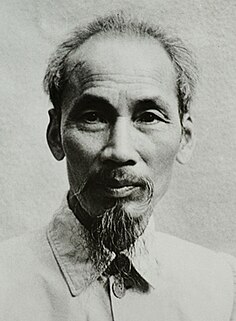 W
WHồ Chí Minh, born Nguyễn Sinh Cung, also known as Nguyễn Tất Thành, Nguyễn Ái Quốc, Bác Hồ, or simply Bác, was a Vietnamese revolutionary and politician. He served as Prime Minister of North Vietnam from 1945 to 1955 and President from 1945 to 1969. Ideologically a Marxist–Leninist, he served as Chairman and First Secretary of the Workers' Party of Vietnam.
 W
WHoàng Cơ Minh (1935–1987) was the first chairman of the Việt Tân. He was elected on September 10, 1982, when Viet Tan was founded. He was considered, among the expatriate Vietnamese, the leader of the anti-communist resistance against the Vietnamese government.
 W
WHoàng Văn Chí was one of the first Vietnamese political writers, a prominent intellectual who was an opponent of colonialism and later of communism in Vietnam. He used the pen name Mạc Định. His book, From Colonialism to Communism, was translated into more than 15 languages.
 W
WNguyễn Thái Học was a Vietnamese revolutionary who was the founding leader of the Việt Nam Quốc Dân Đảng, the Vietnamese Nationalist Party. He was captured and executed by the French colonial authorities after the failure of the Yên Bái mutiny.
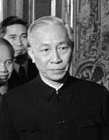 W
WLê Đức Thọ, born Phan Đình Khải in Nam Dinh Province, was a Vietnamese revolutionary, general, diplomat, and politician. He was the first Asian to be awarded the Nobel Peace Prize, but refused the award.
 W
WLê Lợi, temple name Thái Tổ, nickname Lam Sơn động chủ, formal title Bình Định vương was a Vietnamese politician, rebel leader and then the monarch of the restored kingdom of Đại Việt and founder of the Later Lê dynasty after Đại Việt was conquered in 1407 and was briefly incorporated into the Ming Empire of China. In 1418, Lê Lợi and his followers in his homeland rose up against the Ming rules, was called the Lam Sơn Uprising, and 9 years later, his movement successful drove the Ming armies out of Vietnam and liberated the country. Lê Lợi is among the most famous figures of Vietnamese history and one of its greatest heroes.
 W
WLý Tự Trọng was a Vietnamese revolutionary, executed by the French when he was only 17 years old. He is considered to be a revolutionary martyr. In 2010, his remains were identified in District 10, Ho Chi Minh City, and he was reburied in his parents' home town, the Việt Xuyên commune in the district of Thạch Hà.
 W
WNguyễn Hữu Thọ was a Vietnamese revolutionary and Chairman of Consultative Council of the National Liberation Front of South Vietnam from 6 June 1969 to 2 July 1976, and the Chairman of the National Assembly of Vietnam from 4 July 1981 to 18 June 1987.
 W
WNguyễn An Ninh was a radical Vietnamese political journalist and publicist in French colonial Cochinchina. An independent and charismatic figure, Nguyen An Ninh was able to conciliate between different anti-colonial factions including, for a period in the 1930s, between the Communist Party of Nguyen Ai Quoc and its left, Trotskyist, opposition. Nguyen An Ninh died in the French penal colony of Pulo Condore, age 42. He is recognised by the Socialist Republic of Vietnam as a Revolutionary Martyr.
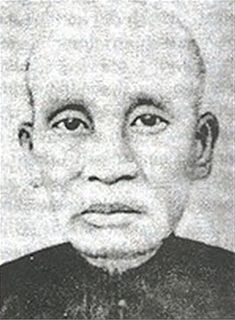 W
WNguyễn Quyền (1869–1941) was a Vietnamese scholar-gentry anti-colonial revolutionary activist who advocated independence from French colonial rule. He was a contemporary of Phan Bội Châu and Phan Chu Trinh, and one of Tonkin Free School's founders.
 W
WNguyễn Thị Bình is a Vietnamese communist leader and politician who negotiated at the Paris Peace Conference on behalf of the Viet Cong, or National Front for the Liberation of South Vietnam.
 W
WNguyễn Thiện Thuật was a Vietnamese revolutionary leader, who commanded armed forces during the anti-colonial struggle.
 W
WNguyễn Trung Trực was a Vietnamese fisherman who organized and led village militia forces which fought against French colonial forces in the Mekong Delta in southern Vietnam in the 1860s. He was active in Tân An and Rạch Giá from the initial French invasion until he was captured and executed.
 W
WNguyễn Văn Linh was a Vietnamese revolutionary and politician. Nguyễn Văn Linh was the general secretary of the Communist Party of Vietnam from 1986 to 1991 and a political leader of the Vietcong during the Vietnam War. During his time in office, Linh was a strong advocate of "Đổi Mới" (renovation), an economic plan whose aim is to turn Vietnam economy to a socialist-oriented market economy. As such, Linh was often touted as the "Vietnamese Gorbachev" after the Soviet leader, who introduced Perestroika.
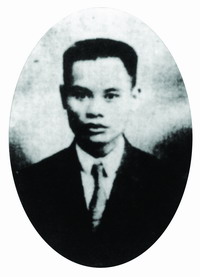 W
WPhạm Hồng Thái (1896–1924) was a Vietnamese activist, revolutionary and a member of Đông Du. He was responsible for the assassination attempt on Martial Merlin, the governor-general of French Indochina then visiting Guangzhou, China.
 W
WPhan Khôi was an intellectual leader who inspired a North Vietnamese variety of the Chinese Hundred Flowers Campaign, in which scholars were permitted to criticize the Communist regime, but for which he himself was ultimately persecuted by the Communist Party of Vietnam.
 W
WPhan Xích Long, also known as Hồng Long, born Phan Phát Sanh (1893–1916), was a 20th-century Vietnamese mystic and geomancer who claimed to be the Emperor of Vietnam. He attempted to exploit religion as a cover for his own political ambitions, having started his own ostensibly religious organisation. Claiming to be a descendant of Emperor Hàm Nghi, Long staged a ceremony to crown himself, before trying to seize power in 1913 by launching an armed uprising against the colonial rule of French Indochina. His supporters launched an attack on Saigon in March 1913, drinking potions that purportedly made them invisible and planting bombs at several locations. The insurrection against the French colonial administration failed when none of the bombs detonated and the supposedly invisible supporters were apprehended.
 W
WPhùng Hưng courtesy name Công Phấn (功奮) pen name Đô Quân (都君) was a military leader who briefly reigned over Vietnam during the 8th century.
 W
WTạ Thu Thâu (1906–1945) in the 1930s was the principal representative of Trotskyism in Vietnam and, in colonial Cochinchina, of left opposition to the Indochinese Communist Party (PCI) of Nguyen Ai Quoc. He was executed by the Viet Minh in September 1945.
 W
WThành Thái born Nguyễn Phúc Bửu Lân (阮福寶嶙), was the son of Emperor Dục Đức and Empress Dowager Từ Minh. He reigned as emperor for 18 years, from 1889 to 1907.
 W
WHoàng Hoa Thám also known as Commander Thám, was an Vietnamese feudal lord of Yên Thế, the leader of the Yên Thế Insurrection that held out against French protectorate in Tonkin for 30 years.
 W
WNguyễn Thị Minh Khai was a Vietnamese revolutionary and a leader of the Indochinese Communist Party during the 1930s.
 W
WTôn Thất Thuyết was the leading mandarin of Emperor Tự Đức of Vietnam's Nguyễn Dynasty. Thuyết later led the Cần Vương movement which aimed to restore Vietnamese independence under Emperor Hàm Nghi.He fled to China seeking for political refuge after Hàm Nghi's captured by France, and later died in Longzhou, Guangxi.
 W
WTrần Thị Liên (1910–1991) was a Vietnamese revolutionary. Trần Thị Liên was born in Yên Nghi village, Nghệ An Province. Her father was a geo-surveyor while her mother was a small merchant in Vinh. Liên attended and finished Nguyễn Trường Tộ primary school in Vinh.
 W
WTrần Văn Cung was a Vietnamese revolutionary, who was the secretary of the first communist cell in Vietnam.
 W
WVõ Chí Công was a Vietnamese Communist politician, and the Chairman of the Council of State of Vietnam between 1987 and 1992. He was the Standing Deputy Chairman of the National Front for the Liberation of South Vietnam from 1962 to 1976.